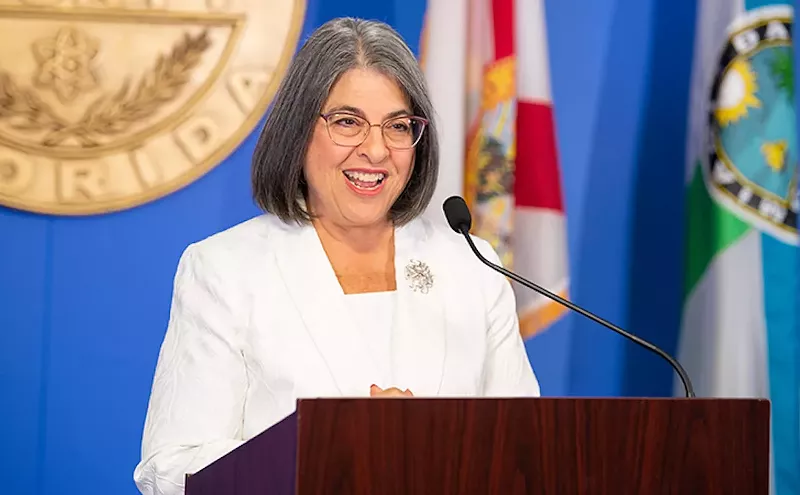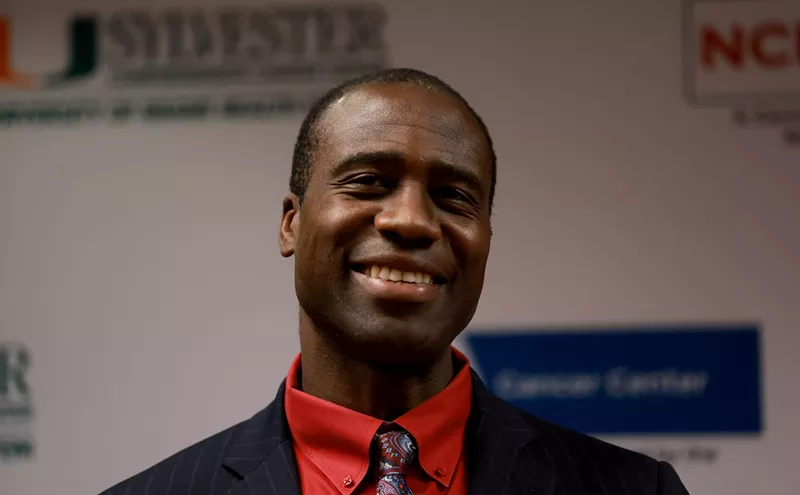Of course, as even a casual radio listener could tell you, the playlists of our local FM outlets have rarely had anything to do with showcasing quality music. The admission that programming choices are often determined by who's willing to cut a check is hardly a shocker. It's on the order of discovering that the saleswoman may have been exaggerating a bit when she gushed over how fabulous you looked in that $500 dress.
What's truly eye-opening about Spitzer's payola investigation is just how little it cost to buy the airwaves. Back in the Fifties, tastemaker DJ Alan Freed demanded -- and received -- co-songwriting credit on Chuck Berry's "Maybelline" before he'd spin it. By the Eighties, as author Fredric Dannen wrote in his seminal study Hit Men, payola costs were often reaching $300,000 per single.
Poring through the 54 pages of internal Sony BMG e-mails released by Spitzer's office reveals just how low the going rate for an "add" (a new single's addition to a station's weekly playlist) has sunk. In his memoir Howling at the Moon: The Odyssey of a Monstrous Music Mogul in the Age of Excess, former CBS Records president Walter Yetnikoff recalled deploying mountains of cocaine and high-priced hookers as simply the cost of doing business. And business was indeed very, very good. Yetnikoff received a reported $20 million bonus after engineering the 1987 sale of CBS to Sony for $2 billion.
But today? Whether you blame it on the rise of MTV or the lures of the Internet, FM's current gatekeepers have learned to temper their appetites. Sony BMG's e-mails show an "add" in a decent-size media market now requires an average of only $1000. Even the personalized bribes tend to be underwhelming: PlayStation video games, a $150 CD Walkman, or for New York City WQHT-FM DJ Enuff, who lives across the river in New Jersey, daily car service to his station.
At WHYI-FM (100.7), Miami's Clear Channel-owned Top 40 station, assistant program director and midday DJ Donnie Michaels attracted attention from Spitzer less for the size of his greed than for his sheer brazenness. Last year, when he was program director for WFLY-FM in Albany, New York, Michaels didn't want only a trip to Manhattan in return for playing Jessica Simpson. He apparently had a taste for swanky, Ian Schrager-style accommodations, which sent Sony BMG staffers scrambling to book him a night at the W New York, though with the caveat to "make sure Donnie is not staying in a room too high -- he has a fear of heights."
Elsewhere, Michaels asks for a digital camera, snags WNBA basketball game tickets, thoughtfully forwards the exact flights he wants for a Las Vegas junket during which he'll lunch alongside Celine Dion, and (just prior to his promotion to Miami) scores a new laptop computer. It's a kickback with its own set of headaches: Sony BMG staffers grumble to each other that their in-house discount for purchasing Sony laptops isn't any better than a trip downtown to the discount retailer J&R Music World. Apparently corporate synergy ain't what it used to be.
Moreover Michaels's off-air persona seems just as crass as his on-air banter. At the Y-100 Website he crows that "after many cold years in New York ... I finally made it to the MIA!" Asked to describe his new life in the Sunshine State, Michaels enthuses, "No pets, no hobbies, no foot fungus ... it's all good!" Little wonder that Fredric Dannen quotes one aging promotions rep in Hit Men as pining for the golden era of the "fifty-dollar handshake": "You didn't have to go out to dinner with someone and kiss their ass. Just pay them, here's the money, play the record."
Some perspective is in order though. Secretly accepting gifts to inflict the latest Kelly Osbourne and Good Charlotte releases on unsuspecting teens may be illegal under federal law (not to mention cruel) but it's hardly a crime on the level of fleecing retirees out of their pensions. In fact, by the standards of Miami's indicted politicos, the sums involved would barely register as walking-around money.
So in the end, beyond the juicy headlines, what does it all mean? With Sony BMG pledging to end payola, and the rest of the similarly subpoenaed major record labels expected to follow suit, can we anticipate a boldly remade radio dial -- coincidentally in time for Spitzer's 2006 gubernatorial bid in New York?
"You're kidding, right?" That was the reaction from one Miami-based Sony BMG executive Kulchur spoke with, who insisted on anonymity, citing a company e-mail instructing employees to adopt the public mantra of No comment. This exec laughed off any notions of Spitzer-induced reform, predicting only a few face-saving terminations (one New York-based promotions executive who figures prominently in the released e-mails has already been fired; four others have had their pay docked). And then Sony BMG and every other major label will find another way of instituting payola, just as they did in the wake of previous government crackdowns. There's too much at stake to do otherwise; radio's influence may be diminishing but it remains a key factor in making or breaking artists.
On the other side of the microphones, expect much the same posturing. Though payola may be endemic in the industry, that didn't prevent Clear Channel Communications from engaging in some self-righteous breast-beating in 2003, announcing that its 1244 stations were severing all ties with independent radio promoters (the main payola conduits in the Eighties) and subsequently requiring each employee to "swear in writing that he or she has not engaged in payola." However, Sony BMG e-mails show that Clear Channel may have been the worst offender of all, even threatening to boycott artists on Sony BMG subsidiary Columbia Records if fees paid to them weren't raised.
During an earlier interview with Kulchur, David Ross, Clear Channel regional vice president for South Florida, bristled at the very suggestion of accepting payola -- particularly at WHYI. "Our airplay is not for sale," Ross had said. "Y-100 is a station that produces 11 million to 12 million dollars in operating profit. You think I'd dare risk a radio station like that to play one record?" Asked for a fresh comment in response to the telltale Sony BMG e-mails, Ross referred Kulchur to a San Antonio-based spokesperson, who reiterated the chain's "zero-tolerance policy" on payola, adding that "any wrongdoing will be met by swift and appropriate disciplinary action."
So we can look forward to a few token heads rolling at Clear Channel's Miramar offices. Donnie Michaels, perhaps steeling himself for a retreat to those brutal Albany winters, wasn't returning Kulchur's calls either -- not even to Y-100's request line. But he did speak to the Los Angeles Times last week as the payola story initially broke, and presumably before David Ross plastered a thick piece of duct tape across the DJ's mouth. Insisting he did nothing wrong, Michaels said, "I was just doing what everyone else was doing." No doubt.
Dont throw out your radio just yet. Miami's pirate-radio broadcasters may have largely devolved into an echo of their commercial brethren, but a few oases of wonderful music remain on the dial, spots where the mandates of the playlist take a back seat to the DJ's individual tastes:
The Modern School of Modern Jazz, WDNA-FM (88.9), Saturdays 11:00 p.m. to 1:00 a.m.
After being unceremoniously dumped from WLRN, veteran host Steve Malagodi found a new home for his avant-garde mix at WDNA. Late Saturday night may not be the most convenient time for basking in Cecil Taylor, Sun Ra, or the array of dissonant and often otherworldly contemporary improvisers Malagodi enjoys pumping out into the ether, but if you need to clear your head (or perhaps break a lease), it's nice to know he's there.
Weekend Jazz, WLRN-FM (91.3), Saturdays 8:00 p.m. to midnight.
Host Tracy Fields (Malagodi's wife) prefers a more straight-ahead approach to the genre, with the emphasis on salving the soul instead of shocking it. Think Keith Jarrett, Abbey Lincoln, and of course John Coltrane.
Nocturno 92, WCMQ-FM (92.3), weekdays 7:00 p.m. to midnight.
If you're a middle-age Latino, you hardly need Kulchur to hep you to the glories of Clsica 92. You've already made WCMQ the number one station in Miami. But many Anglos still seem unaware of host Julio Antonio Ramos and his parallel sonic world of Latin oldies but goodies, complete with Sixties Uruguayan rock combos doing their own raucous takes on Van Morrison's Brown Eyed Girl and Roberto Jordan's cover of Redbone's slinky Seventies bump-and-grinder Come and Get Your Love. When Ramos slips in the odd Bee Gees track, as well as a background loop of fake applause and syrupy strings, it makes the entire experience even more delightfully surreal.
WVUM-FM (90.5)
Being a station run entirely by students at the University of Miami -- not an institution known for attracting hordes of free-thinking bohemians and cultural excavators -- WVUM's fare is largely hit or miss, and in flux every fall. Still each semester brings a handful of young DJs passionate about underground sounds, willing to dig a bit deeper than this month's indie-rock flavors, and eager to share their discoveries with an off-campus audience. One summer bright spot: Sundays from 7:00 to 10:00 p.m. -- the only place in town to hear old-school honky-tonk country.
Old School Quiet Storm, WHQT-FM (105.1), Sundays 8:00 to 11:00 p.m.
Even better than bopping along to host Freddie Cruz's sets of slow-churning Seventies funk is grooving to his gravelly musings about life, love, and ... well, mostly love. Cruz is a master of the deep-throated come-hither, one part Barry White, one part Scarlet Pimpernel. And don't be alarmed by those strange crackling noises you occasionally hear between songs. It's just a phonograph needle tracking across those big black discs we once called records.












